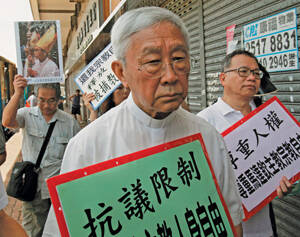The State Department issued its annual report on religious freedom on July 30. Secretary of State Hillary Clinton offered a “sobering” global depiction of fundamental human rights at risk. “More than a billion people live under governments that systematically suppress religious freedom,” she said. “New technologies have given repressive governments additional tools for cracking down on religious expression. Members of faith communities that have long been under pressure report that the pressure is rising. Even some countries that are making progress on expanding political freedom are frozen in place when it comes to religious freedom.”
Secretary Clinton added, “When it comes to this human right, this key feature of stable, secure, peaceful societies, the world is sliding backwards.” But the report also found some reason for hope in the near future regarding the expansion of religious freedom, including in some perhaps unexpected places like Myanmar and Egypt. “Several countries with diverse faith communities are now in the process of navigating transitions toward democracy,” she said. “They are wrestling with questions of whether and how to protect religious freedom for their citizens. This goes from Tunisia to Burma and many places in between.”
Secretary Clinton said that during a recent visit to Egypt she had a “very emotional, very personal conversation” with Christians who are deeply anxious about what the future holds. “What Egypt and other countries decide,” she said, “will have a major impact on the lives of their people and will go a long way toward determining whether these countries are able to achieve true democracy.”
She said, “I personally feel very strongly about this, because I have seen firsthand how religious freedom is both an essential element of human dignity and of secure, thriving societies. It’s been statistically linked with economic development and democratic stability. And it creates a climate in which people from different religions can move beyond distrust and work together to solve their shared problems.”
According to the report, the interim government of Egypt began to take measures toward greater religious inclusiveness, passing an anti-discrimination law, arresting and prosecuting alleged instigators of sectarian rioting and allowing dozens of churches previously closed to reopen. “Nevertheless,” it added, “sectarian tensions and violence increased.”
The report documented the Egyptian government’s failure to curb rising violence against Coptic Christians and its involvement in violent attacks, including an attack by Egyptian security forces on October 9, 2011, against demonstrators in Cairo that left 25 dead and 350 injured, “most of whom were Coptic Christians.” The report notes that no government officials have been held accountable for such abuses so far.
In Myanmar, according to the report, the government took steps toward overcoming a “longstanding legacy of intense religious oppression,” eased some restrictions on church construction and “generally permitted adherents of religious groups registered with the government to worship as they chose.”
China was again included on the list of nations of “particular concern.” According to the report, China experienced a “marked deterioration” of religious freedom in 2011, including further religious repression in the “Tibetan Autonomous Region,” continuing repression of Muslims in China as well as continuing friction with Catholics loyal to the Vatican.
Other states designated as “countries of particular concern” for alleged violations of religious freedom included three other Asian nations—Myanmar (Burma), North Korea and Uzbekistan—and Eritrea, Iran, Saudi Arabia and Sudan. Other countries with notable religious conflicts included Pakistan and Nigeria, but European nations also came under scrutiny in the report.
According to the report, rapid demographic changes in Europe have been accompanied by “growing xenophobia, anti-Semitism, anti-Muslim sentiment and intolerance toward people considered ‘the other.’”








